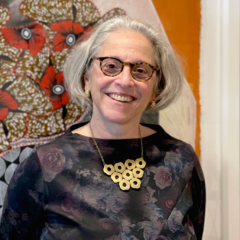Lawsuit Alleges Discrimination Against Blind Students
Duke University systematically discriminates against blind students and alumni in violation of the Americans with Disabilities Act and the Rehabilitation Act, according to a lawsuit filed today. The action, brought by the National Federation of the Blind and Duke MBA Mary Fernandez, alleges that Duke failed to ensure that blind students can interact with digital content and platforms and access course materials—including hard-copy Braille materials and hard-copy tactile graphics when requested and appropriate—on an equal basis with students without disabilities.
According to the lawsuit, Plaintiff Mary Fernandez is a blind student who began the Duke Daytime MBA program in the fall of 2018. To read print, Ms. Fernandez uses screen access software, Job Access with Speech (“JAWS”), which vocalizes the text using synthesized speech or displays it on a connected device called a refreshable Braille display. For STEM subjects, Ms. Fernandez also uses hard-copy Braille and tactile graphics to better understand the complex concepts because refreshable Braille displays only display a single line of Braille cells at a time, and thus are not useful for complex equations, coordinate planes, diagrams, maps, and other graphics.
Ms. Fernandez met with the Assistant Director of Student Life before she enrolled and was assured Duke would provide the accommodations she needed to have equal access to her education. From the start, however, Ms. Fernandez experienced barriers that permeated every aspect of her educational experience. When she applied for admission, she encountered an inaccessible web-based application. When she registered online for courses, she could not access the course descriptions. When she utilized the employer recruiting system, she could not set up her user profile and could not utilize any of the search functions. In addition, Duke failed to provide Ms. Fernandez with timely access to accessible course materials, including hard-copy Braille and tactile graphics when she requested them. As a result, Ms. Fernandez was continually forced to divert her time and attention away from her studies to advocate for equal access to her education.
“Blind students must have access to course materials in accessible formats including Braille, along with equal access to digital platforms and content, at the same time as sighted students in order to have an equal opportunity to succeed,” said Mark Riccobono, President of the National Federation of the Blind. “This is not a new issue; it has been a focus of our advocacy for nearly two decades, and institutions of higher education have no excuse for not meeting this legal and moral obligation. The blind cannot and will not tolerate discrimination of this kind.”
“The failure to provide blind students with timely, accessible course materials and career services not only harms their educational experience, it puts their future career and economic self-sufficiency at risk,” said Virginia Knowlton Marcus, chief executive officer of Disability Rights North Carolina. “Duke University, in particular, has previously been sued by Disability Rights NC regarding the inaccessibility of its course materials and has the responsibility to know better and do better.”
“I expected an institution with Duke’s high standards and reputation to be able to meet my needs as a blind student and was assured that would happen,” said Ms. Fernandez. “Instead, my time at Duke has been something of a nightmare. I hope the action I am now taking will improve things for future blind students who want to attend Duke.”
The plaintiffs are represented by the attorneys of Disability Rights NC and the law firm of Brown, Goldstein & Levy.

